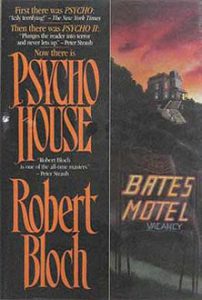In this series, I’m looking back at the books and movies of the “Psycho” franchise before its TV revival in “Bates Motel,” which will conclude its five-season run this month.
Four years before his death at age 77, Robert Bloch concludes his “Psycho” book trilogy with “Psycho House” (1990); like “Psycho II,” it’s a meta-commentary on popular culture and it explores the idea that everyone has just a sliver of Norman Bates in them. The character studies of Amy Haines, a Chicago author looking to write a book on the Bates case, and various Fairvale authority figures and residents double as clues. (This time around, the town feels like it’s in Missouri rather than Kansas; I’m continually amazed that the internet provides no solid answer to Fairvale’s location.) We ask ourselves not only about motives, but also whether the person is capable of being a killer.
“Psycho House” is more traditional than the first two books because it’s a straight-up mystery. In the first chapter, a kid – snooping through the rebuilt Bates house, now a tourist attraction – is murdered. From that point forward, everyone is a suspect. In the first book, a reader is “told” Mother is the killer, then surprised when it’s Norman. In the second book, we’re “told” it’s Norman, then surprised again. Respecting readers enough to not try the trick a third time, Bloch gives us no preconceived notions in “Psycho House.”
Ultimately, what makes this my favorite of the trilogy is that Bloch is such a confident writer at this point in his career. Although all three books possess a hardboiled charm, the prose really sings here, perhaps because it’s a straightforward whodunit. Reflecting on her treatment by Fairvale natives, Amy notes that “She had already been convicted of being female and was suspected of being a writer as well as an out-of-towner to boot.” Eating at a country club, the narrator notes that it’s “a recreational center for wealthy businessmen who have not yet been indicted.” And almost every sentence out of local newspaperman Hank Gibbs’ mouth is a cynical one-liner, like: “As the captain of the Titanic said, that’s just the tip of the iceberg.” (Gibbs is somewhat of an author surrogate. Bloch cheekily labeled his 1993 autobiography “unauthorized,” mirroring a Gibbs line.)
The banter between Amy – who tries to approach her research with utmost professionalism – and the cynic Gibbs is a lot of fun, and the reporters’ pavement-pounding behavior mostly rings true. Overall, Amy is a pleasurable character to spend time with (most of the book is from her POV). If she had been the main character in more mystery novels, I would’ve picked them up.
Another new character is Dunstable, a demonologist who theorizes that demonic possession explains psychotic behavior, and traces a chain from Norma Bates through Norman and up to the current events. It’s probably not much of a spoiler to say he’s mistaken (if the “Psycho” series had moved into “Exorcist” territory, it would’ve been disappointing for abandoning its own niche), but Dunstable’s theories make for a tasty metaphor. Even Dr. Steiner, the straight-laced psychologist introduced in the second book, likens the world at large to one big asylum. With his references to the rise in American street violence in “Psycho II” and the way entrepreneurs and media jackals look to cash in on the Bates-related murders in “Psycho House,” it’s clear Bloch is cynical about our cynical culture.

The author also has sharp things to say about collectivism – first, the fact that it’s not a great philosophy, and second, that many collectivists are hypocrites about their own philosophy. Many of the Fairvale residents resent Amy for her book project, thinking it will exacerbate what they’ve already experienced. For example, a deputy tells Amy that when he attended school out of town, he was made fun of for being from Fairvale. People believe there is something innate to Fairvalians that made the existence of Norman Bates possible. (Amy counters with the argument that her honest account will clear up misconceptions, but even she admits she’d love the fame of a hit book, and she toys with putting the juicy demonology stuff in there, even though she knows it’s bunk.)
Once Amy gets national news exposure, the townies warm up to her because she’s famous. The sheriff’s secretary, hostile to Amy throughout the story, now smiles at her. That’s Bloch’s ultimate statement in the “Psycho” books: While society may not produce many serial killers, it does produce lots of hypocritical collectivists, always eager to find a popular collective to join, even if it means jumping from “I hate the visiting author” to “I love the visiting author” as if that was their point of view all along. In fact, those people might even be in the majority.
And that’s my biggest surprise from reading this trilogy: While 1959’s “Psycho” is what I expected from my knowledge of the Hitchcock film, I was surprised that the sequels are not about Norman Bates; rather, the Bates case serves as a springboard for exploring human psychosis. I did not mind this surprise one bit; indeed, I love Bloch’s writing on these issues, and enjoyed each book more than the last. No, you won’t get much insight into Norman himself in these sequels, but the movies, TV show and one other book in the Bloch narrative (Chet Williamson’s “Psycho Sanitarium,” set between “Psycho” and “Psycho II”) provide that. If nothing else, because Bloch created Norman Bates, we should respect the fact that the saga inspired him to explore a different path than the filmmakers and TV showrunners.

